| AP COMPANY (3175) |
|
||||||||
Company |
AP COMPANY CO., LTD. |
||
Code No. |
3175 |
||
Exchange |
Tokyo Stock Exchange 1st Section |
||
Industry |
Retail |
||
President |
Hisashi Yoneyama |
||
HQ Address |
KDX Shiba-Daimon Building, Shibadaimon 2-10-12, Minato-ku, Tokyo |
||
Year-end |
March end |
||
Home Page |
|||
* Share price as of close on June 16, 2016. Number of shares outstanding as of most recent quarter end does not include treasury shares. ROE and BPS are from the previous year.
|
||||||||||||||||||||||||
|
|
* Estimates are those of the Company.
* From the previous fiscal year, the definition for net profit has been changed to net profit attributable to parent company shareholders (Abbreviated as Parent Company Net Income). |
|
| Key Points |
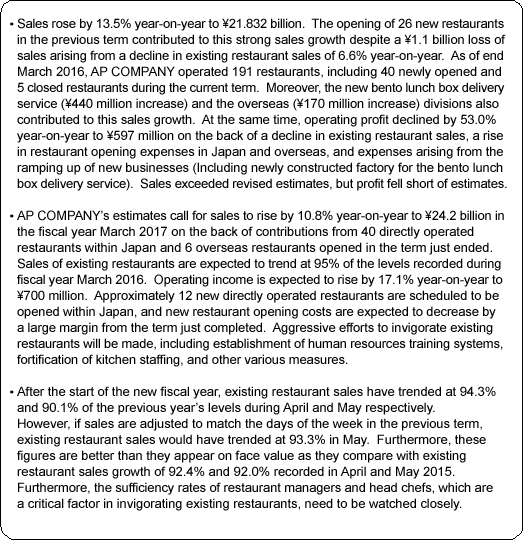 |
| Company Overview |
|
The number of restaurants is 243 as of end March 2016, including 52 restaurants with licensed style. <Corporate History>
President Hisashi Yoneyama established AP COMPANY as a private company for the production of restaurants in October 2001 and thereafter rapidly expanded the business. At the time, Mr. Yoneyama realized that there were various difficult issues confronting "izakaya" Japanese style pubs arising from conditions within the food distribution structure and food producers. Therefore he sought to not only simply operate izakaya restaurants but also to help rectify these issues. Subsequently, Mr. Yoneyama decided to avoid simply purchasing food products from distributors and went directly to the producers due to the benefits to both food producers and consumers of creating a "direct producer seller channel business model" and to realize reforms to Japan's restaurant industry. This became the main mission of AP COMPANY and the "direct producer seller channel business model" has become a huge differentiating characteristic of the Company.First, Mr. Yoneyama worked diligently to create a relationship of trust with poultry farmers raising good tasting free range chicken, and in February 2006 he created a limited liability company called AP Farm as a subsidiary in Nichinan City, Miyazaki Prefecture. Along with the establishment of this subsidiary, a directly operated poultry farm was also constructed and in-house free range chicken production was started. In addition to being able to reduce purchasing prices by large margins, the creation of this business model was also able to improve the business environment for producers by resolving the issues of a shortage of successors and by creating new employment opportunities within the poultry farming business. Consequently, President Hisashi Yoneyama has been able to validate the ability of this business model to change Japan's food industry by linking "consumers directly to producers". As part of this process, Mr. Yoneyama realized the importance of acting as a bridge linking the two parties and conveying the conditions that food producers were facing to consumers. Therefore he became even more strongly committed to realizing the "producer to distributor business". AP COMPANY launched its "Nichinan City, Miyazaki Prefecture Tsukada Nojo" izakaya brand serving free range chicken directly sourced from poultry farmers in August 2007. Furthermore, the Company launched its "Yonpachi Gyojo" fresh seafood izakaya brand in July 2011. In addition to being able to provide delicious foods at reasonable prices through the participation in both the production and distribution processes, AP COMPANY has been successful in gaining brand recognition for various types of chicken raised in throughout Japan by highlighting them on their menu. This unique business model has also contributed to increases in repeat usage by customers and a rapid expansion in sales. The successes of this business model also enabled AP COMPANY to list its shares on the Mothers Section of the Tokyo Stock Exchange in September 2012, and to transfer to the First Section in September 2013.  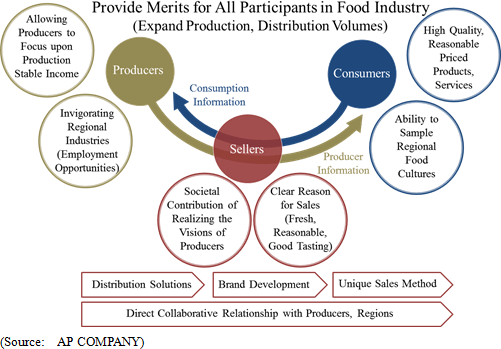  <Business Description>
AP COMPANY identifies the following points as key issues within the food industry which need to be resolved.
◎ Being Conscious of Issues Surrounding the Food Industry ◎ Business Model
With the mission of resolving these issues by "pursuing the ideal vision of food and eating", AP COMPANY seeks to "invigorate primary industries (Agriculture and fishing)", and "raise the quality and reduce prices of products and services provided". At the same time, the Company will integrate the functions of food production (Primary industry), distribution (Secondary industry) and sales (Tertiary industry) by deploying a "producer to seller directly linked business model" as part of the sixth sector industrialization movement.
(*) Sixth Sector Industrialization
"In general, the term sixth sector industrialization refers to efforts to comprehensively promote the primary industry which includes agriculture and fishing, secondary industry which includes manufacturing, and tertiary industry which includes retail services, and leveraging regional natural resources to create new value addition. In the case of AP COMPANY, the term secondary industry is used to describe the distribution services industry. The term sixth sector is derived from the addition of 1 plus 2 plus 3, or the multiplication of 1 by 2 by 3, of the primary, secondary and tertiary industries. Characteristic 1: Creating an In-House Food Production Structure and Collaborating with Regional Producers
In addition to forming direct collaborative relationships with seafood producers and other regional producers with food products that have strong competitive potential, AP COMPANY is also conducting its own in-house production of poultry and cultivation of fish (Chicken farming and processing, fixed net fishing) through subsidiaries established in the local markets. With regards to the traditional distribution structure where numerous wholesale companies operate, opportunities for face-to-face meetings between the actual producers and sellers of food products are few and far between. However, in AP COMPANY's business model, producers and sellers of food products meet directly and there are many opportunities for full- and part-time workers to gain a deeper understanding of the conditions of the food producers. Through these opportunities, AP COMPANY staff are able to gain a stronger understanding of the difficult conditions faced by food producers and the hard work that goes into growing and cultivating food products. In turn, staff can describe the conditions of how the poultry and other food products that are served at AP COMPANY restaurants are grown to customers with confidence. In addition, the food producers can get important feedback on "how, where and by whom the food products they grow and cultivate are consumed" to be used in the production of foods in the future. Characteristic 2: Distribution Solutions
AP COMPANY also proposes solutions to issues in the distribution structure that can lead to a reduction in costs and a shortening of delivery times, allowing for food products to reach end users in fresher condition. Also, processed product solutions are proposed to utilize fish and other products which previously went unused.
(*) Unused Fish
Proposals to utilize fish which are too small for commercial sale, or fish varieties which are unrecognized by consumers as a means of increasing product value and raising income of fishing company operators. Characteristic 3: Brand Creation, Diffusion
With the goal of gaining a better understanding for regional food cultures, specialized food products, food production methods and the philosophies of the food producers, information about the food producing regions and the food products themselves are listed in the restaurant menu books as a means of increasing value addition of the experiences of customers dining at AP COMPANY restaurants. Also, the Company can create an even stronger brand through this deeper understanding of the overall business cycle gained by its participation in the various production processes for foods.
Characteristic 4: Invigoration of the Primary Industry, Regional Economies
Based on the goal of conducting integrated operations spanning food production, distribution and sales to provide food products at appropriate pricing levels and on a sustained basis, AP COMPANY seeks to create a business environment where stable and adequate levels of income are provided to the food producers, which in turn will create new employment opportunities within the primary industries and contribute to invigoration of regional economies.
◎ Business Segments
AP COMPANY's business can be divided into the two main business segments of the production and distribution, and the sales businesses.
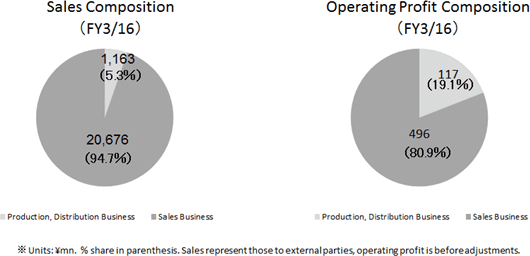 <Production, Distribution Business>
As part of the "direct producer seller channel business model", production and processing of poultry, seafood, fruit and vegetables are conducted. These food products are supplied to AP COMPANY's own directly operated restaurants and to restaurants licensed by AP COMPANY, in addition to sales to restaurants and stores outside of the AP COMPANY Group.
① Poultry Production, Distribution
A subsidiary was established in Nichinan City, Miyazaki Prefecture in 2006 for the production of "Miyazaki Free Range Chicken" at its own farms. In 2007, a processing plant was constructed. And in 2010, a baby chicken center was integrated with the poultry processing plant to establish an integrated manufacturing structure. In addition, this knowhow was leveraged for the start of production and sales of "Shintoku Free Range Chicken" (Hokkaido) from 2011 and "Kuro Satsuma Chicken" (Kagoshima) from 2012.
② Fresh Fish Cultivation, Distribution
By leveraging the "morning catch delivery service" to deliver fish and other seafood which were caught in the morning to restaurants by the same evening, AP COMPANY is expanding the direct transactions between fishermen and fishing cooperatives and end users that do not pass through wholesale markets. A subsidiary called Project 48 Co., Ltd. was established in Nobeoka City, Miyazaki Prefecture in 2011 for the joint operation with the local fishing cooperative of fixed net fishing business. In addition, AP COMPANY acquired a license to participate in fruit auctions at the Ota Market, enabling it to make direct purchases of fruits. In addition, the Company has also established direct channels with fruit farmers across the nation.
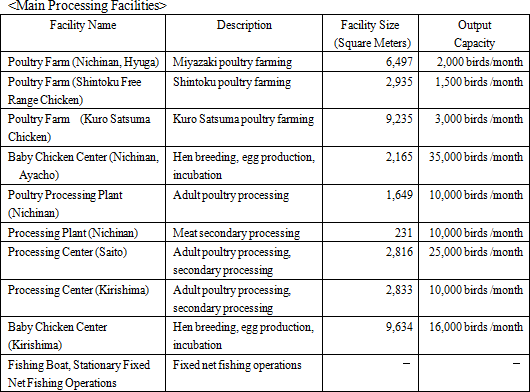 <Sales Business>
The sales business is comprised of the two restaurant brands of "Tuskada Nojo" restaurants that serve free range chickens raised at AP COMPANY's own farms, and "Yonpachi Gyojo" restaurants that serve fresh seafood cultivated by fishermen from around Japan. The average pricing per customer is about ¥4,000 and the restaurants are operated primarily around the Tokyo metropolitan region. The number of direct managing restaurants is 191 as of end March 2016. In addition, the company licenses the outlet brand to 52 restaurants managed by external companies. Furthermore, it operates home meal replacement stores as part of its sales channel diversification strategy.
<Characteristics and Strengths>
The unique sales methods employed at Tsukada Nojo and AP COMPANY's other restaurants are a strong distinguishing characteristic of its unique sales method. Based upon consumer psychology analysis results that show "service that exceeds expectations to provide customers with excitement and satisfaction leads to high repeat ratios by customers", the ability to provide customers with freedom in the service that staff offer to customers within a set budget leads to high repeat business.1. Unique Sales Methods The repeat rate refers to "the number of customers that pay return visits to restaurants relative to the total number of customers visiting the restaurant." (In order to measure the frequency with which customers who become fans of AP COMPANY's restaurants bring friends with them on their return visit, AP COMPANY places a greater emphasis on the number of groups visiting the restaurant.) Some of President Yoneyama's thoughts regarding the unique sales promotion methods used to differentiate AP COMPANY restaurants from his book "Atypical New Restaurants" are provided below. * "Value Addition Provision Talk"
Restaurant staffs act on behalf of AP COMPANY to convey the important values of "food producers." AP COMPANY is able to accurately convey conditions and issues confronting food producers to customers because of its own direct participation in the process of food production. It is also this process of conveying information that is considered to be an important "value added service".The conveying of information to customers visiting AP COMPANY restaurants is considered to be an overwhelming differentiating factor and a "reason for customers to visit its restaurants," enabling it to become the "restaurant of choice. Ex.) This is our speciality, charcoal-grilled free-range chicken. Fresh free-range chicken raised at our company's poultry farm is cooked rare, which is the most delicious degree of doneness. First, savor the delicious flavor of the chicken by itself, and then enjoy it together with our home-made yuzu kosho (a blend of citrus and peppers.) This fish is known as "dark sleeper," and is a famous fish of the Sanriku Coast. Although not well-known in the Kanto region, this delicious fish is a favorite of locals. Enjoy the sublime flavor of fresh dark sleeper that has been simmered. * "Teppan (Iron Plate) Jab"
In order to gain repeat usage of customers, AP COMPANY seeks to provide them with "exciting" experiences and services which they have not experienced at other restaurants. This sales promotion method is known as "teppan (Iron plate) jab" within AP COMPANY. (Jab to knock the customer out with an overwhelmingly exciting experience.) Example: When the menu item called "Jittoko Sumibiyaki" is provided, staffs inform customers that the dish should be eaten with "yuzu kosho green Japanese citrus pepper sauce. Staffs then inform customers that they should try the dish with red pepper sauce after they have eaten some of the dish. Staffs also explain to customers that the "Jitokko Sumibiyaki" it is not designed to be eaten cold. So they then suggest that the dish can re-warmed and eaten with Nichinan citrus vinegar. Once the customer has finished the dish, staff take the hot plate upon which it is served away to be used to cook fried rice using the juices from the "Jittoko Sumibiyaki". The idea of serving the dish with red Japanese citrus pepper sauce in addition to the green Japanese citrus pepper sauce was suggested by a part-time staff. Based upon this idea, product development staff conducted an extensive nationwide search for the best food ingredients to be used for this dish. In this manner, the ideas of our part-time staff have been leveraged to "develop delicious food products to be enjoyed by customers" and are used to provide value added services including the conversations between staff and customers. Restaurant managers create an environment in restaurants where staff can actively propose ideas such as this to create a unique experience that differentiates the restaurants. 2. Training Program
Based upon these sales methods of "value added conversations" and "iron plate jabs", AP COMPANY seeks to "pursue the ideal vision of how the Japanese food service industry should be," as its basic corporate philosophy to be understood and ingrained through training of both its full- and part-time staff. In order to gain the understanding of this philosophy by its staff, AP COMPANY boasts of a unique training program.◎ Endeavors to Diffuse Corporate Philosophy Because there were no staffs who were able to lead the training efforts initially, the Company relied upon external trainers to lead its initial training efforts. However, there were some shortcomings in the use of external trainers as most did not have the experiences working in the food industry. In response to this problem, President Yoneyama hired an outside consultant to establish training knowhow within the Company. Currently, AP COMPANY boasts of 33 staff who serve as training leaders. There are limitations as to how far President Yoneyama can diffuse the corporate philosophy, mission, and the goals of AP COMPANY. Therefore restaurant manager class staff have been cultivated to serve as training leader to be able to lead training classes of between 100 to 200 staff. Furthermore, a goal of restaurant staff is to become a training leader. A reason for the enhanced training system of AP COMPANY is its bountiful training materials and the realism of its training based upon the participation in various parts of the food production process. Based upon the "direct producer seller channel business model" and AP COMPANY participation in the primary, secondary and tertiary industries, AP COMPANY seeks to teach its staff about "invigorating the primary industries and regional economies", "resolving issues in the secondary industries", and "the value of life", in addition to techniques to interface with customers. Its training course is also filled with materials designed to establish a sense of empathy amongst its staff. For example, newly hired staff are sent to Miyazaki Prefecture for two to three weeks of training during the third year of work. Free range chickens are prepared for shipment at four to five months after hatching. And at the meat processing plant they are cut into three parts. Many of the staff attending the processing plant cry at the sight of the actual processing of the chickens. Subsequent to this moving experience, they take a much more serious and deeper consideration of the sacrifices needed to provide food to consumers. In turn, these same staff begin to ponder the question of "what exactly is their role in this process", and they gain a new sense of appreciation for animals and plants provided as delicious meals for consumers. Scenes of this training program are recorded to be shown to newly hired full- and part- time staff. Thereafter, staff are taught about their role in restaurants. Through these experiences, newly hired staff are taught the corporate philosophy, vision, and mission. At the same time, they also gain an understanding of the motivation and philosophies of food producers, which are then explained in the course of providing various foods to customers. ◎ Advantages of M&A
This training program is also a vital tool in the strategy of conducting aggressive M&A activities. In order to succeed in M&A, "the ability to discover superior M&A targets" and "implement M&A at appropriate pricing" is an important factor. However, another important factor is the ability to implement effective post merger integration (PMI) in order to extract synergies from any M&A activities.Obstacles to integration need to be validated in the early stages of M&A activities to secure solid integration effects from M&A activities. Furthermore, management structure integration needs to be promoted after M&A is conducted. Consequently, PMI is an important theme that will determine whether or not management can overcome differences in corporate cultures. Normally, employees of companies being taken over in M&A activities generally suffer a decline in motivation. However, in the case of AP COMPANY, the training program plays an important role in "gaining an understanding for and diffusing corporate philosophies" to achieve a common mindset that will help unite the group and mobilize the strengths of both companies. 2. Recruiting Part-Time Staff
While the shortage of part-time workers in the food service industry is severe, AP COMPANY has been far more successful in securing human resources than its competitors. AP COMPANY also endeavors to raise employee satisfaction in addition to customer satisfaction. As part of the hiring process, AP COMPANY places emphasis on whether or not an applicant can gain understanding and empathy for its corporate philosophy and mission. Therefore, the Company conducts "employment support seminars" for potential new part-time staff. Part-time staff are taught about job searching and how to be prepared for work in this seminar. In addition, they are also given referrals to jobs. The fact that job seekers have worked at "Tsukada Nojo" is considered to be a positive factor by other companies considering employment of former AP COMPANY staff, because of its rigorous training program. Consequently both potential workers and other companies seeking to hire former AP COMPANY staff consider employment at AP COMPANY to be a positive.In addition, AP COMPANY also conducts an award program for staff who propose good ideas as a means of increasing overall staff motivation and cultivating skills of each individual staff. This program is highly regarded amongst student workers. These programs allow AP COMPANY to avoid having to raise hourly pay by large margins to attract and hire part-time staff, and they have contributed to a relatively long employment retention period of 1.9 years and stability in its work force.  |
| Fiscal Year March 2016 Earnings Results |
 Sales Rise Despite Decline in Existing Restaurant Sales, Higher New Business Expenses Cause Profits to Fall
Sales rose by 13.5% year-on-year to ¥21.832 billion. 26 new store openings in the previous term contributed to sales growth despite a loss of ¥1.1 billion in sales arising from a 6.6% year-on-year decline in existing restaurant sales. As of end March 2016, AP COMPANY operated a total of 191 restaurants, including 40 new openings and 5 closures during the current term. Moreover, the new bento lunch box delivery service (Increased by ¥440 million) and the overseas (Increased by ¥170 million) divisions contributed to this sales growth.Operating income declined by 53.0% year-on-year to ¥597 million on the back of a decline in existing restaurants sales, rise in costs of new restaurant openings in Japan and overseas, and expenses associated with the ramping up of new businesses (Construction of a new factory for the bento lunch box delivery service). Sales exceeded revised estimates (Announced in February 2016), but profit fell short of estimates. 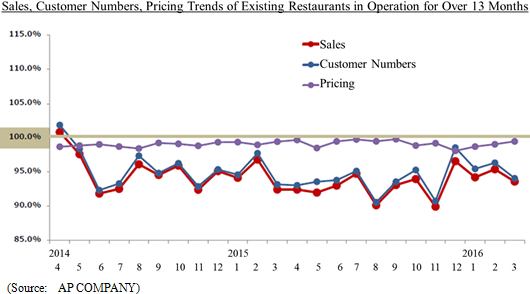 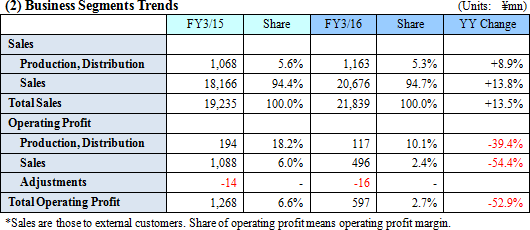 ◎ Production, Distribution Business
With regards to fresh fish, AP COMPANY is endeavoring to expand its network of direct transactions with fishermen on a nationwide basis throughout Japan that do not pass through wholesale markets and wholesalers to help strengthen the Yonpachi Gyojo brand stores.As for fruit and vegetables, AP COMPANY is also expanding its direct transactions with individual farmers to realize stable procurement of high quality products and to diversify its menu structure. With regards to free range chicken, production of free range chicken in Miyazaki, Kagoshima, and Hokkaido Prefectures is being expanded to respond to opening of new Tsukada Nojo brand restaurants. At the same time, declines in sales volume of free range chicken at existing restaurants within Japan and increases in start up costs for a breeding hen farm in Kagoshima contributed to the decline in profits. ◎ Sales Business
Sales of existing restaurants declined by 6.4% year-on-year, but sales of total restaurants rose by 10.7% year-on-year.The total number of free range chicken format Tsukada Nojo and other restaurants totaled 33, the "Yonpachi Gyojo" format 4, and the wedding, duck, barbecued chicken formats 1 each, with 4 stores in overseas markets for a total of 44 stores newly opened in fiscal year March 2016. At the same time, closure of 6 stores brought the total number of stores in operation to 191 at the end of March 2016. The main factor behind the lower profits was the increased competition between existing restaurants located centrally within metropolitan regions caused by the accelerated opening of new restaurants. Therefore, AP COMPANY maintains a focus upon repeat usage of existing restaurants, which is currently trending at 54.9% or just about in line with its target of 55%. 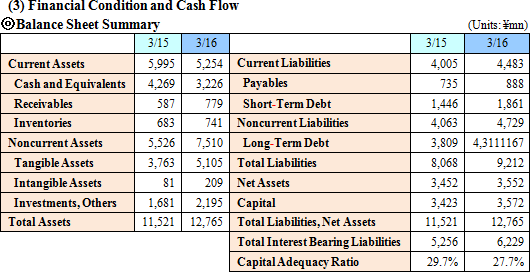 Total liabilities rose by ¥1.143 to ¥9.212 billion on the back of increase in long- and short-term debt. Net assets rose by ¥99 million to ¥3.552 billion due to increases in retained earnings and treasury stock. As a result of these developments, capital adequacy ratio fell by 2.0% points from the previous term to 27.7%. Total interest bearing liabilities rose by ¥973 million to ¥6.229 billion.  |
| Fiscal Year March 2017 Earnings Estimates |
 Efforts to Improve Profitability of Existing Restaurants, Sales and Operating Profit Expected to Grow
Sales are expected to grow by 10.8% year-on-year to ¥24.2 billion on the back of contributions from 40 directly operated restaurants in Japan and 6 overseas restaurants opened during the term just ended. Sales of existing restaurants are expected to trend at 95% of the previous year's levels.Operating profit is expected to rise by 17.1% year-on-year to ¥700 million. While about 12 new directly operated restaurants are scheduled to be opened, opening costs are expected to decrease by a large margin from the previous term. With regards to its overseas operations, AP COMPANY seeks to achieve ¥1.0 billion in sales from a total of 9 restaurants, including 3 restaurants acquired in April 2016, and to realize profitability. In the bento lunch box delivery service, the start-up procedure of the Shinkiba Plant was finished in the first half of fiscal year March 2016. Shipment volume is expected to further increase on the back of efforts to develop sales facilities during the coming term. Efforts to optimize sales mix and improve manufacturing efficiency are expected to contribute to a large reduction in operating loss, and help establish a foundation to achieve profitability. (2) Strategies for the Coming Term
With regards to the term just completed, in which profits declined for the first time since AP COMPANY's founding, the Company reflects upon the year and identifies some of the issues behind the first decline as follows.
① Reflecting upon the Term Just Completed ② Priority Measures and Policies in the Coming Term
In light of the above findings, AP COMPANY will promote the following operational policies to help rebuild its businesses.
<Establishment of Newly Opened Restaurant Human Resources Training Systems> Vice President Okubo himself will provide training at these restaurants twice a week. <Fortification of Kitchen Organization>
Efforts will be made to improve skills of kitchen staff. Training to enrich the knowledge of food materials and cooking techniques will be provided with synergies expected to be derived from these efforts.A "Meister System" that recognizes and rewards staff with high levels of cooking skills has been implemented to increase motivation of staff. In addition to the already existing "Flame Meister" recognition system, new specialized recognition systems including "Egg Meister", "Handling Meister", "Knife Meister", and "Frying Pan Meister" will be introduced to raise the overall skill level of kitchen staff. <Inbound (Overseas Customer) Measures>
Measures will be made to strengthen AP COMPANY's response to inbound customers visiting from overseas, an area where no specific measures have been taken until now.Efforts will be made to facilitate restaurant environments that allow for ease of use by individual customers from overseas.  Aside from these efforts, AP COMPANY will also aggressively promote refurbishment of restaurants that have been open for more than 5 years. Furthermore, all headquarter staff, including President Hisashi Yoneyama himself, will allocate a significant amount of time to attend to operations of existing businesses. |
| Conclusions |
|
However, if sales are adjusted to match the days of the week in the previous term, existing restaurant sales would have trended at 93.3% in May. Furthermore, these figures are better than they appear on face value as they compare with existing restaurant sales growth of 92.4% and 92.0% recorded in April and May of 2015. Furthermore, the sufficiency rates of restaurant managers and head chefs, which are critical indicators of progress in the revitalization of existing restaurants, need to be watched closely. Disclaimer
This report is intended solely for the purpose of providing information, and is not intended as a solicitation to invest in the shares of this company. The information and opinions contained within this report are based on data made publicly available by the Company, and comes from sources that we judge to be reliable. However, we cannot guarantee the accuracy or completeness of the data. This report is not a guarantee of the accuracy, completeness or validity of said information and or opinions, nor do we bear any responsibility for the same. All rights pertaining to this report belong to Investment Bridge Co., Ltd., which may change the contents thereof at any time without prior notice. All investment decisions are the responsibility of the individual and should be made only after proper consideration.Copyright(C) 2016, Investment Bridge Co., Ltd. All Rights Reserved. |



